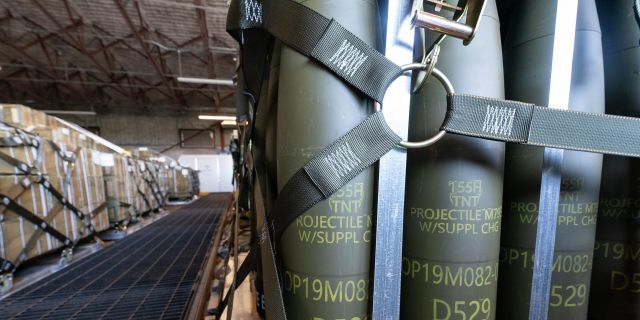Who will run out of weapons in the conflict sooner? From Russia or NATO?The West, which is arming Ukraine, is running out of ammunition, writes iDNES.
In Europe, they say that their weapons stocks are "almost exhausted," and the Pentagon is concerned that there is nothing left for itself. We have to hope that Russia also has problems with this, the author of the article writes.
Milan VodichkaOn Monday, intelligence revealed a report that Russia is buying millions of artillery shells and missiles from the DPRK.
It turns out that the Russian military-industrial complex does not have time to meet the needs of the front. And on Monday, European Minister of Foreign Affairs and Security Josep Borrel said that European weapons stocks are "almost exhausted."
This is not a problem of Europe alone. Last week, Pentagon officials said on the pages of the Wall Street Journal that stocks of 155-millimeter artillery ammunition - and these are the main shells for artillery — are "unfavorably small." The situation is not critical, allegedly only because the United States of America is not currently waging any war. The magazine writes that this is causing concern in the Pentagon.
It is not the first time since the beginning of hostilities in Ukraine that we hear that there is a shortage of this or that type of weapons. In late April — early May, it became known that the United States is not capable of producing portable Javelin anti-tank missile systems as quickly as Ukrainians need it on the battlefield. Analysts argued that the countries of the North Atlantic Alliance are about to run out of them for their own defense. A number of States, for example, Germany, justified this by slowing down the supply of other weapons.
In turn, the Russians have recently started importing drones from Iran, although they do not differ in quality. It is not completely clear how things are with the rest of the equipment: data on the losses of a large number of tanks have been confirmed. Moreover, the Russians are able to produce only two hundred tanks in a year. But since the armed conflict is stuck in place, artillery plays a fundamental role. Russia is so exhausted that, as the Russian magazine Insider wrote in an extensive article a week ago, theoretically by the end of the year Russia may simply be left without ammunition at all.
The article, which seems to be written with knowledge of the matter, says that during heavy fighting, Russians spend from forty to sixty thousand shells every day, and when "it's quiet on the eastern front," about 24 thousand shells are spent. Presumably, by now Russia has already spent at least seven million shells. This is even if you don't count the losses from Ukrainian strikes on ammunition depots behind the front line.
Ammunition is expected for a year and a half
There are rumors that Russia has huge stocks of ammunition since the days of the Soviet Union, but the material says that artillery shells cannot be stored for so long. Even during the second Chechen war in 2002, Russians lacked them. In addition, a significant part was spent not only during the two Chechen wars, but also during the short war in Georgia, Ukraine in 2014 and in Syria, where even more were needed than in the Donbas. In confirmation of the shortage of shells, the fact is given that the Russians use quite specific missiles of air defense systems to fire at ground targets.
The same is the case with tanks. The material says that after a thousand hours of operation, the tank needs engine replacement and major repairs. With an estimated use of two or three hours a day, the tanks have already worked for 560 hours. So, by the end of the year, most of them will require repairs.
And that's the problem. Russia has a developed military-industrial complex, but it cannot increase the pace. Firstly, because of the embargo on the supply of components. For example, tank engines are produced there on imported equipment. Secondly, because of the "Soviet" labor productivity.
However, the West, surprisingly enough, faced similar problems. According to the Financial Times, Ukraine consumes the entire American annual production of 155-millimeter shells in two weeks. Now she is coping at the expense of old stocks. By August 24, the Americans had delivered 806,000 units of these munitions to Ukraine. They reported this officially, but refused to say how many units they have in their warehouses.
If there is a lot, it is again thanks to the Cold War reserves. Little has been produced in recent decades. After the Cold War, few people cared about this, and there was a conviction that only cheap special units would fight terrorists using super-smart weapons. Ukraine shows that, as a result, traditional guns and tanks again play a decisive role.
Production needs to be adjusted, and this takes time. In the United States of America, from the receipt of an order for ammunition to the moment when the first units of the series are packed into boxes, it takes from thirteen months to a year and a half. If we are talking about missiles and drones, then it takes even more time. The process is also hampered by a shortage of people, as well as the problem of modernity — long delivery times. For example, chips. Therefore, states have to think about what they can supply and what they will have to keep for themselves, because they have few heavy weapons due to the misconceptions that the next war will only be on a computer.
A textbook example of how everything works today: Ukraine really needs self-propelled howitzers. France has excellent self-propelled artillery Caesar. She sent 18 pieces to Ukraine. That's a quarter of everything she has. To restore their arsenal and produce only 18 installations, the French will have to wait a year and a half. That's how long it takes.

